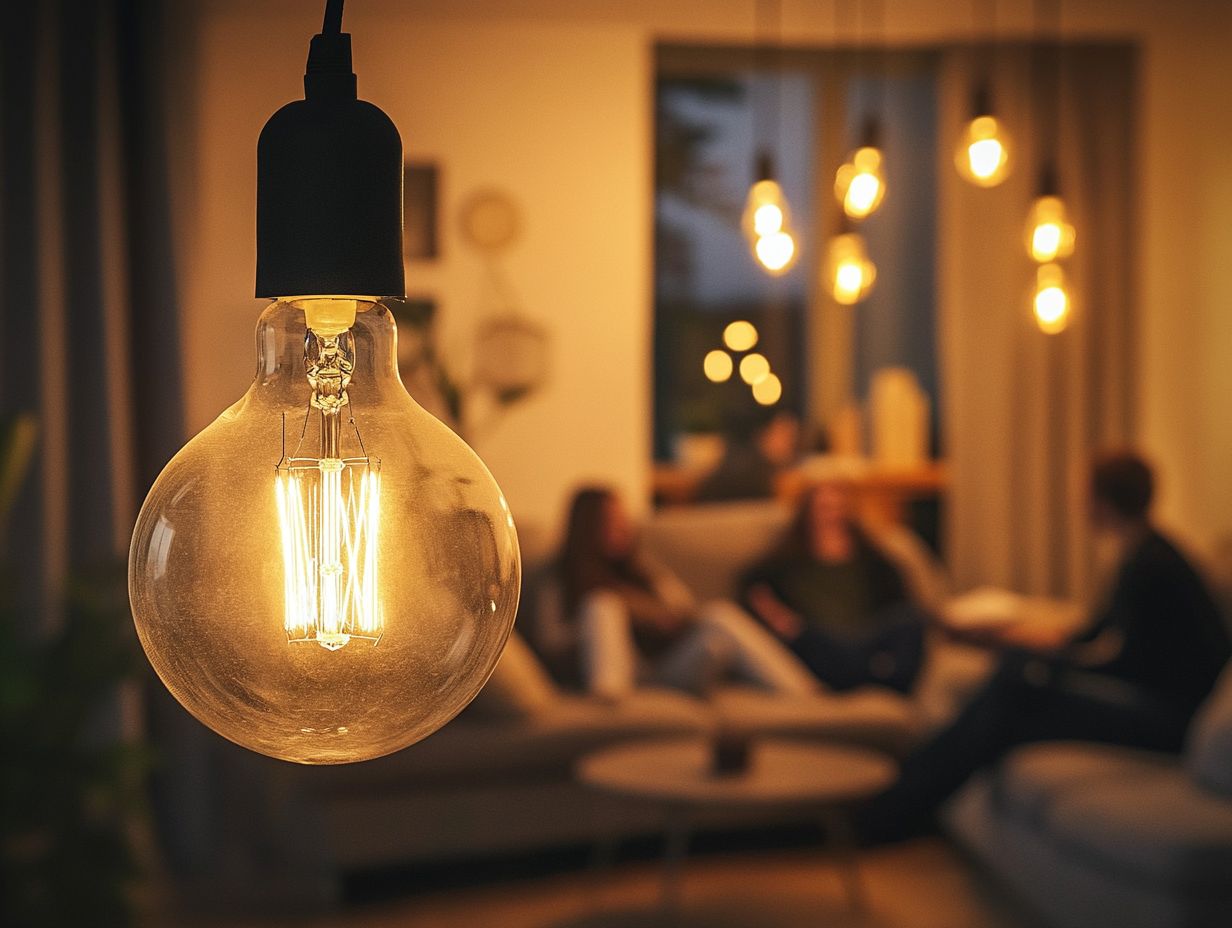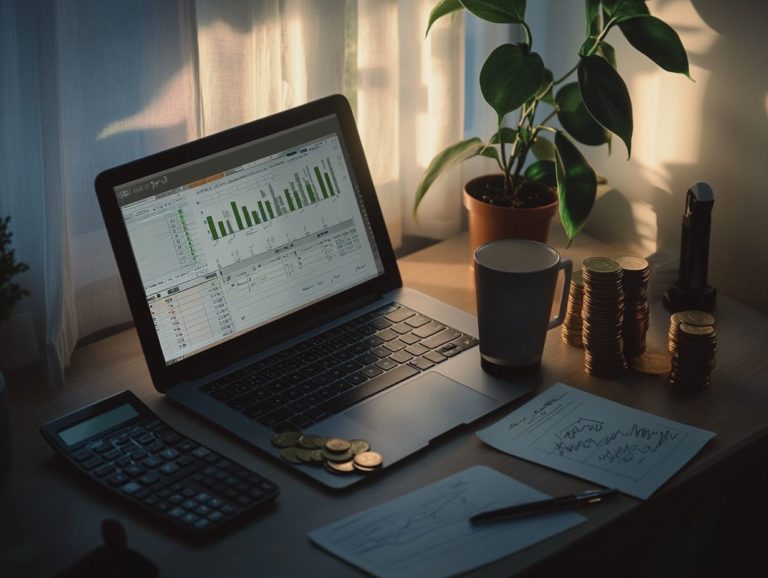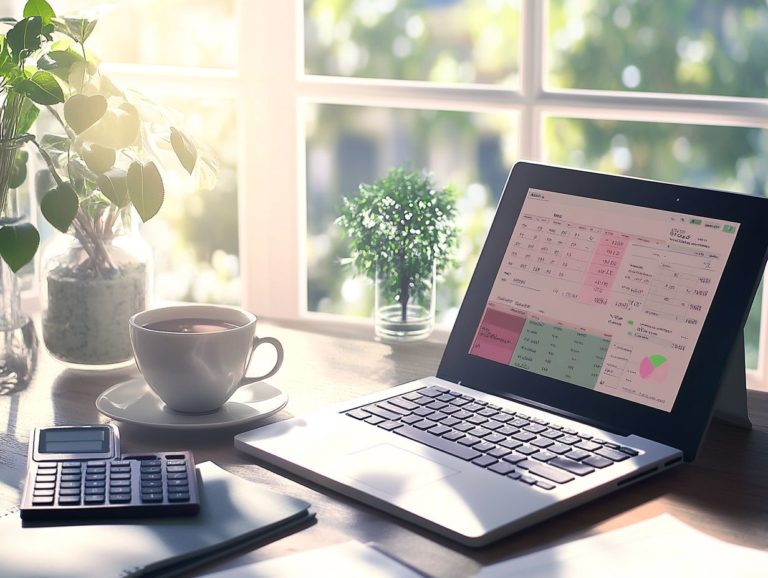How to Save Money on Utilities?
Don t let utility bills drain your budget! Discover practical strategies to cut costs today!
Managing utility costs has become essential, especially with rising energy prices and the need for sustainable practices. Utility bills can take a chunk out of your budget. Discover strategies that save you money and enhance energy efficiency.
By understanding how your utility costs work, you can lower your bills and promote sustainability in your home. This approach not only benefits your budget but positions you for better long-term investments in your household.
Contents
- Assessing Your Utility Usage
- Ways to Reduce Your Utility Costs
- Key Takeaways:
- Alternative Energy Sources
- Negotiating with Utility Companies
- Government Assistance Programs
- Frequently Asked Questions
- Want to save money on your utility bills? Here s how!
- Can I negotiate my utility rates?
- Are there any government assistance programs to help save money on utilities?
- How often should I compare utility rates?
- What are some simple ways to save money on water usage?
- How can I save money on my electric bill?
Assessing Your Utility Usage
Assessing your utility usage is an essential step toward minimizing energy costs and unlocking substantial savings on your bills. Checking your energy use gives you valuable insights into your consumption patterns, pinpointing appliances that use a lot of energy and uncovering opportunities to fine-tune your thermostat settings.
Understanding Your Bills and Usage Patterns
Understanding your utility bills and usage patterns is crucial for effective energy management and cost reduction. By analyzing your electric bills and unpacking components like times when energy costs more and usage trends you can uncover opportunities to save money and optimize energy consumption in your home.
This awareness enables you to make informed decisions about your energy use, potentially leading to substantial savings over time. For instance, if you identify the hours when energy rates are higher, you can shift your usage to off-peak times, reducing overall costs. Be aware of changes in your energy use patterns. This helps you spot inefficiencies and invest in energy-saving technologies.
Ultimately, a deep understanding of your utility bills enables you to take control of your finances while embracing a more sustainable lifestyle.
Ways to Reduce Your Utility Costs
You have access to a variety of effective strategies for reducing your utility costs, allowing you to save money while enhancing energy efficiency in your home. By implementing energy-saving measures like adjusting your thermostat, utilizing energy-efficient appliances, and carefully managing your water usage you can not only lower your bills but also significantly reduce your overall energy consumption over time.
Key Takeaways:

- Assess your utility usage to understand your utility bills and usage patterns for better energy management.
- Implement energy-saving habits and invest in energy-efficient appliances like Energy Star models to reduce utility costs.
- Explore renewable energy options and consider negotiating with utility companies for lower rates.
Implementing Energy-Saving Habits

Implementing energy-saving habits into your daily routine is an easy way to lower your utility bills. Even small changes like adjusting your thermostat or taking shorter showers can lead to significant savings over time.
Unplugging appliances when not in use also contributes to your savings. Every little bit helps!
Beyond these simple tweaks, investing in energy-efficient appliances can dramatically reduce your consumption. Keep an eye out for the ENERGY STAR label when you shop; it s a mark of efficiency you can trust.
Embrace the power of natural light by opening your curtains during the day; this can help you cut back on artificial lighting. You might also consider setting reminders to turn off lights and electronics before leaving a room, which can enhance your mindfulness around energy usage.
By cultivating these habits, you not only reduce your carbon footprint but also join a broader movement toward energy conservation, paving the way for a more sustainable future for generations to come.
Investing in Energy-Efficient Appliances
Investing in energy-efficient appliances is not just a smart financial move; it s a step towards a more sustainable home environment that can significantly reduce your utility costs. When you choose products with the Energy Star label think energy-efficient water heaters and smart thermostats you select items known to consume less energy, leading to long-term savings on your utility bills.
These appliances often come equipped with smart features that help them work better, ensuring they run at peak efficiency. It s a win for your wallet and the planet!
While the initial investment in Energy Star products might seem daunting, the substantial savings you ll see over time often make them more economical than traditional options. Many local utility programs offer incentives for purchasing these energy-saving appliances, which further enhances their value.
Ultimately, transitioning to energy-efficient choices is a savvy financial strategy that also demonstrates your commitment to environmental consciousness.
Alternative Energy Sources
Exploring alternative energy sources presents a compelling opportunity for homeowners aiming to boost energy efficiency while curbing utility costs. Embracing renewable energy options, like solar panels, offers not only substantial savings but also a chance to contribute to a sustainable future by reducing dependence on conventional electricity providers.
Exploring Renewable Energy Options
Exploring renewable energy options like solar panels can significantly enhance your energy savings while providing a sustainable alternative to traditional electricity providers. By harnessing solar power, you can not only reduce your utility bills but also make a meaningful contribution to a cleaner environment.
These innovative systems capture sunlight through photovoltaic cells, the technology that converts sunlight into electricity. This enables you to generate your own power and opens the door to potential earnings by selling surplus energy back to the grid.
Financially, the initial installation cost can often be offset by government incentives and declining technology prices, making solar panels an increasingly viable option for you. Environmentally, reducing reliance on fossil fuels means lower greenhouse gas emissions, which plays a crucial role in combating climate change.
As communities transition toward renewable energy, you ll find that local economies benefit from new job opportunities within the green energy sector, further enriching the landscape around you.
Negotiating with Utility Companies
Negotiating with utility companies presents a valuable opportunity for homeowners to secure lower rates and enhance their overall energy costs. By understanding your options and exploring energy assistance programs, you can approach electricity providers with confidence.
This knowledge enables you to negotiate favorable terms, opening the door to significant cost-saving opportunities that can positively impact your budget.
Start making these changes today to see your savings grow!
Tips for Negotiating Lower Rates

Negotiating lower rates with your utility providers is a smart way to reduce your utility costs and enhance your financial well-being. By employing effective negotiation techniques, such as referencing competitor rates and exploring energy assistance programs, you can position yourself for successful outcomes.
It’s essential to understand current energy market trends. This knowledge enables you to present a compelling case during negotiations. Gathering past billing statements will give you valuable insights into your usage patterns, making it easier to spotlight inconsistencies or potential savings.
Ask about loyalty discounts; these discounts for staying with the same provider can often unlock additional savings. Timing is important, so reach out at the end of a billing cycle or during promotional periods to boost your chances of securing a better rate.
Always enter these discussions with a friendly yet assertive demeanor. Be open to exploring alternative plans or payment options that could optimize your overall energy spending.
Government Assistance Programs
Government assistance programs are essential for helping you manage your utility costs, particularly during times of soaring energy prices.
Programs like the Low-Income Home Energy Assistance Program (LIHEAP) provide crucial support to eligible individuals and families. This support ensures access to vital energy services without overwhelming financial strain.
Available Programs and Eligibility Requirements
Numerous energy assistance programs are available to help you navigate rising utility costs, each with its unique eligibility criteria. Familiarizing yourself with these options can unlock valuable resources and financial relief, ultimately making energy services more manageable.
Programs like LIHEAP and the Supplemental Nutrition Assistance Program (SNAP) provide crucial financial aid to cover heating and cooling expenses. Applicants typically need to meet specific income thresholds, usually set at or below 150% of the federal poverty level.
Along with these federal programs, local initiatives often cater to community-specific needs, offering emergency assistance for unexpected bills. Seizing these opportunities can significantly reduce the burden of energy expenses, ensuring your household stays warm in winter and cool in summer without the persistent worry of financial strain.
Frequently Asked Questions
Want to save money on your utility bills? Here s how!
There are several ways to save money on utilities, including using energy-efficient appliances, turning off lights and electronics when they are not in use, and adjusting your thermostat to save on heating and cooling costs.
Can I negotiate my utility rates?

You may be able to negotiate your utility rates with your provider. Before doing so, research the average rates in your area and be prepared to provide evidence of your usage and needs.
Are there any government assistance programs to help save money on utilities?
Yes, there are government assistance programs such as LIHEAP that can provide financial assistance to qualifying households for their utility bills.
How often should I compare utility rates?
It is a good idea to compare utility rates at least once a year to ensure you are getting the best deal. Consider switching providers if you find a better rate.
What are some simple ways to save money on water usage?
You can save money on water usage by fixing leaky faucets, taking shorter showers, using a low-flow showerhead and toilet, and collecting rainwater for outdoor use.
How can I save money on my electric bill?
To save money on your electric bill, use LED light bulbs, unplug electronics when not in use, and employ a programmable thermostat to regulate the temperature in your home. Switching to a renewable energy provider can also lead to potential savings.






